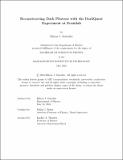| dc.contributor.advisor | Harris, Philip C. | |
| dc.contributor.author | Scheuller, Ellison J. | |
| dc.date.accessioned | 2024-06-27T19:47:58Z | |
| dc.date.available | 2024-06-27T19:47:58Z | |
| dc.date.issued | 2024-05 | |
| dc.date.submitted | 2024-05-20T16:12:32.554Z | |
| dc.identifier.uri | https://hdl.handle.net/1721.1/155363 | |
| dc.description.abstract | The DarkQuest experiment will search for dark photons by looking for their decay into standard model leptons which can be detected. DarkQuest will use the momentum of these standard model leptons to calculate the position or vertex where the dark photons decay. Looking at the vertex positions will show if a dark photon was detected and if it is, physicists will be able to confirm DM predictions and learn a lot about the nature of dark matter which has yet to be detected. We use simulation to study the performance of the vertex reconstruction algorithm that will be used on DarkQuest when it starts taking real data. The vertex is calculated using the vertex reconstruction algorithms which are outlined in this thesis. The performance of the algorithm is then analyzed by looking at the vertex reconstruction efficiency, sensitivity, and displaced dimuon mass resolution. | |
| dc.publisher | Massachusetts Institute of Technology | |
| dc.rights | In Copyright - Educational Use Permitted | |
| dc.rights | Copyright retained by author(s) | |
| dc.rights.uri | https://rightsstatements.org/page/InC-EDU/1.0/ | |
| dc.title | Reconstructing Dark Photons with the DarkQuest Experiment at Fermilab | |
| dc.type | Thesis | |
| dc.description.degree | S.B. | |
| dc.contributor.department | Massachusetts Institute of Technology. Department of Physics | |
| mit.thesis.degree | Bachelor | |
| thesis.degree.name | Bachelor of Science in Physics | |
